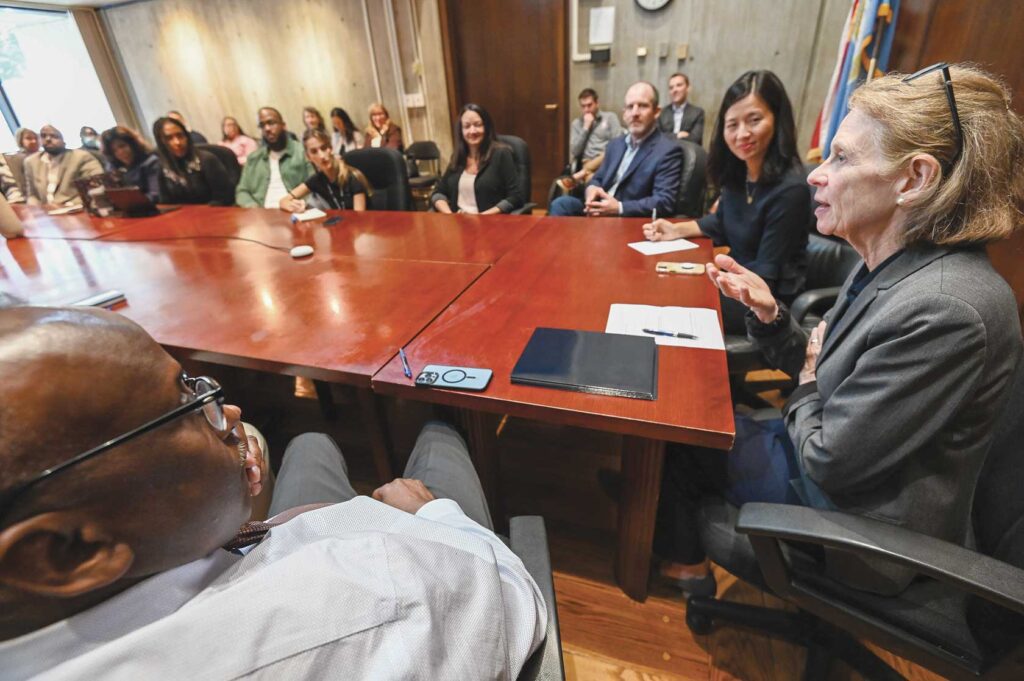City announces second set of developers for affordable housing in Dorchester, Mattapan

Taking another step toward bolstering affordable homeownership in Boston, Mayor Michelle Wu announced last week the team of developers who will build 70 residential units on 15 parcels of land in Dorchester and Mattapan.
As part of a project titled “Welcome Home, Boston,” developers will take 15 vacant city-owned parcels in Dorchester and Mattapan, underutilized for over 30 years, and convert them into affordable housing condos for low- and moderate-income families.
“Welcome Home, Boston represents a transformative step towards making homeownership more accessible for our residents,” said Mayor Michelle Wu in a press release.
This second phase will be spearheaded by six development teams: Ambry Development; Boston Neighborhood Community Land Trust/Co-Everything; Codman Square Neighborhood Development Corporation; KNG Realty Corporation; KZ Builders LLC; and Visionary Investors Building Equity/Mass Construction and Management Inc.
Selected during an RFP (request for proposal) process that evaluated proposals based on experience, financial feasibility, design concept and more, the development teams are all certified minority- and women-owned enterprises, which the city said represents its goal of hiring local and minority partners and promoting diversity.
“As we work to make Boston a home for everyone, I’m thrilled to partner with these six development teams who embody the talent, diversity and passion of our communities,” Wu continued in the press release. “Their work will help make Boston home for everyone, as we create much-needed homeownership opportunities in our neighborhoods and reshape the industry building them.”
In 2022, the city’s elected officials began planning to promote housing in the city, with the Mayor designating $60 million from the American Rescue Plan Act, a federal COVID relief fund, to create income-restricted housing and increase homeownership.
The city conducted a land audit and identified vacant parcels across Boston, including a large number “within neighborhoods that historically have been underserved and underrepresented,” namely Dorchester, Mattapan and Roxbury, said Antonio Leite, senior housing development officer in the Neighborhood Housing Development Division of Boston’s Office of Housing.
The first phase of the Welcome Home, Boston initiative, announced in 2023, began the conversion of 12 city-owned parcels in Dorchester into 72 condos.
The project overall will take place over at least four phases, according to the city’s website, with phases three and four still to be determined.
The condos built in the first two phases will be all-electric and energy-efficient, and thus environmentally-friendly.
Once the units are completed and available for occupancy, which Leite estimates will be in 2026, the Boston Home Center will market the properties and issue a lottery program for qualified first-time buyers. There will be some units offered for households at 80% or below of the area’s median income (AMI) and some for those at 100% AMI or below.
To ensure the long-term affordability of the housing properties, the city has a deed restriction that caps the sale price of the units, Leite said. The restriction has a 30-year time cycle with a 20-year extension option.
“There is a need in the city for this type of development, and there’s not enough of these developments,” Leite said.
In Boston, the homeownership rate is 35%, compared to a 62% rate across Massachusetts, according to the press release. Add to that the considerable differences that exist in homeownership numbers depending on race and ethnicity. For example, the homeownership rate is 44% among white households, 31% among Black or African American households and 30% among Asian or Pacific Islander households. Those rates are almost halved for Hispanic/Latinx households, with just 17% owning homes.
Through the city’s initiative, the city hopes to make affordable homeownership possible in neighborhoods of color, Leite added.
“The affordable housing piece is very important,” said Kendra L. Roe, the owner of KNG Realty Corporation, one of the development partners that will work on parcels in Mattapan.
In recent decades, Roe, who grew up in Brighton, noticed an exodus of families from Boston, driven in part by soaring rent prices, particularly those families with no inheritance. When it comes to keeping people in Boston, she said, “One of the ways is to take advantage of the subsidies that the state and the city are going to provide to developers to put the housing in these infill pieces of land that are surrounding the city.”
The federal funding, Leite said, made the project possible, and Roe said, “The city’s financing is a significant piece of how the formula works.” The sale price of affordable units doesn’t cover lofty construction costs, she said, so the city’s funding is necessary, particularly for small developers run by small teams. In KNG’s case, Roe is both the company’s owner and its only employee.
The total development cost for the first and second phases will be approximately $45.1 million and $55.7 million respectively, the city said.
The construction process will be challenging, Roe said, but rewarding.
“When you get to the point that the Home Center has been able to select the buyer, and they’re so excited when they go to the house, and they are envisioning their family living in that house, and they know which child is getting which bedroom, and they’re excited to buy furniture,” Roe said, “… it makes the whole struggle of this process very worthwhile because this is the point — we want to put families in homes that they deserve to be in.”






